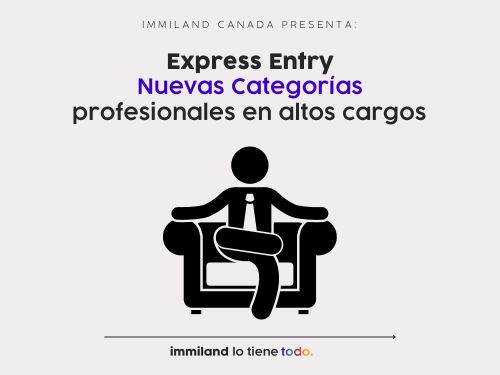Express Entry may include new categories for professionals in senior positions

.jpg)
The Canadian government is considering launching new categories for the Express Entry system in 2026. This time, giving priority to managers, scientists and military personnel to actively work in the country to meet the demand for these senior positions and, in turn, have the opportunity to apply for permanent residence (PR).
Although it is not a fact yet, at the date of publication of this article, there is a public consultation open until September 3, 2025, so the month of August will be a waiting period for the government's decision.
In this blog, I will provide initial information on this potential new category that would benefit highly skilled workers in management positions. Read with me to the end and stay up to date so you can evaluate if you qualify in the future and prepare now. Let's get started!
What are the Express Entry categories?
Immigration, Refugees and Citizenship Canada (IRCC) currently has 6 categories for the Express Entry system.
- Proficiency in French
- Occupations in the health and social services field
- Science, technology, engineering and mathematics (STEM) occupations
- Commercial occupations
- Agricultural and agri-food occupations
- Educational occupations
The seventhpotential occupational category contemplates senior managers, scientists and researchers and military personnel, who are considered skilled professionals to bring new perspectives and talents with a focus on accelerating digital transformation, improving productivity and helping businesses in Canada achieve their goals.
Senior management occupations (people in leadership positions)
Ultimately, the department believes that the arrival of high-level candidates will strengthen the country's competitiveness, leading to stronger economic growth and greater business prosperity.
This seventh category would be a breakthrough for companies to optimize their performance, increase their productivity and become more globally competitive. On a more specific level, it would be generating new high-quality jobs, attracting foreign investment and strengthening Canada' s position as a leader on the international stage.
Scientific and research occupations
As for scientists and researchers, there is still no specificity on what type of professionals would be selected, but they are prioritized in the plan foreseen for next year, as Canada starts from the premise that scientific research and innovation are drivers of economic progress and firmly believes that investment in these fields leads to new discoveries and technologies and accelerates more efficient processes and higher-value products.
National security and defense occupations
The proposal to create a national security and defense-based selection category would be a strategy to consolidate the Canadian Armed Forces (CAF). The Canadian government, through the IRCC, seeks to address a critical need in the security area by facilitating the immigration of highly skilled military recruits.
- This category focuses on qualified military personnel from allied countries.
- The main objective is to support CAFs with the selection of talent with military skills and experience that are directly transferable and valuable to the armed forces.
- This initiative would put Canada on par with countries that already have similar programs to recruit foreign military personnel and facilitate their residency.
The creation of this category would make it possible to attract trusted military talent, filling strategic vacancies and strengthening its defense capabilities, all through an expedited immigration channel such as Express Entry.
How does Express Entry category selection work?
Canada's Express Entry system has been focusing on responding to the needs of the labor market and the country's economic objectives. While Express Entry is based on the Comprehensive Ranking System (CRS) score to select the best immigration profiles, since 2023 to date, there is the new form of selection with category-based draws.
This means that, in addition to general lotteries, the federal government identifies sectors with high demand for workers (such as, for example, health, technology, skilled trades, education, etc.) and issues specific invitations to candidates who demonstrate experience in those occupations.
This is a huge advantage because, even if your CRS score is not the highest, you may be selected if your skills fit into one of these priority categories.
What to do while IRCC discusses the new category?
The best strategy while waiting is to take advantage of the time to prepare your immigration profile. This means that from now on you should:
- Evaluate their academic credentials.
- Improve your level of English or French for official exams.
- To thoroughly understand the Express Entry system.
- Keep informed from trusted platforms and accept advice only from Canadian endorsed professionals, these include CICC regulated consultants and validly licensed Canadian immigration lawyers.
Preparation is the key to success in Canada's immigration process. 2026 is just a few months away and, if the decision for the new category is made, your immigration profile should already be on track. Therefore, we highly recommend taking the first step now.
If you have questions in the preparation process, you can contact us for a free evaluation. I hope this topic will be useful and your profession will be considered for this possible new Express Entry category.
Thank you very much for reading. See you in the next blog!
With love,
Immiland Canada
Note: This article does not constitute legal advice or legal opinion from an attorney. Rather, it is provided solely to inform readers about certain aspects related to the details of the law in legal matters.








.jpg)















.jpg)